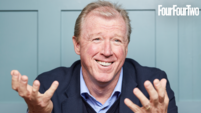Arjen Robben, You Ask The Questions: 'They called me the "man of glass" – but I had the last laugh'
The Dutch ace has retired aged 35 after a glittering career with the likes of Chelsea, Real Madrid and Bayern Munich. He answered your questions about his career in May 2018...
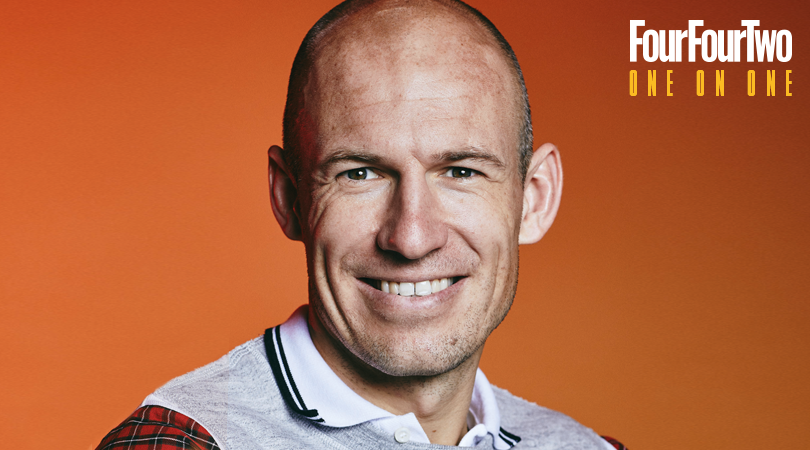
Photography: Stefan Hobmaier
What’s your earliest football memory? Did you like going in the ‘cages’ that are so popular with young people in the Netherlands?
Henk van der Voort, The Hague
I guess my earliest football memories are of playing in the street and also the little pitches at school. I joined the local football team in my village when I was small, but we would play only once or twice a week. I honed my skills just by playing for fun with friends after school.
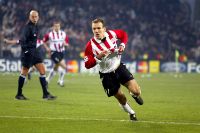
2000-02 Groningen
2002-04 PSV
2004-07 Chelsea
2007-09 Real Madrid
2009- Bayern Munich
Speed has always been one of your trademarks – were you any good at athletics as a kid?
Simon Christie, via Facebook
At school I did a bit of athletics and the pace was always there, although it was never something I really considered as a professional career path. It’s strange because my parents were not that fast – my mum is quicker than my dad! It’s been a great weapon for me, however, and a lucky one, too – you either have it or you don’t.
You were still studying at school when you made your debut for Groningen – your mates must have been jealous...
Rudy Schmidt, Rotterdam
I remember my mum called me two or three times while I was in class. When I rang her back she told me Groningen had called and that I was in the squad that weekend. It came out of the blue and I wasn't expecting it. I'd never even trained with the first team but the coach put me on the substitutes’ bench. My friends were really happy for me. It was also quite strange for them to see me playing on the television and then read about me in all the newspapers.
Get FourFourTwo Newsletter
The best features, fun and footballing quizzes, straight to your inbox every week.
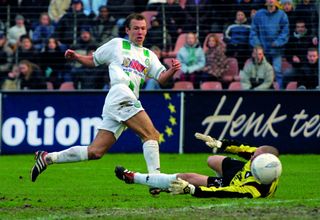
You suffered with numerous injuries early in your career. Did you fear that you wouldn’t fulfil your potential because of them?
Oliver Weinhardt, via Twitter
I never had problems with injuries as a kid or in the youth team. My injuries started at Chelsea, when I broke my foot during a pre-season game. That was just pure bad luck, but after that I had some muscular injuries too, so I had to get to know my body better. I tried to find out how to take care of it, to avoid breaking down all the time. Some players never have any injuries and others, like me, have to do more specific things to ensure they stay fit.
PSV’s fans labelled you and Mateja Kezman ‘Batman and Robben’ due to your understanding on the pitch. What made your relationship with him special, and why didn’t it work out at Chelsea?
Roland Smith, Worcester
We had a brilliant team at PSV at that time and my job was simply to set him up as much as possible. There was also Dennis Rommedahl on the right wing, who was very, very fast, so we created a lot of opportunites for Mateja and he scored a lot of goals. Unfortunately he didn’t play too much when we were at Chelsea, so we weren’t able to have the same success on the pitch together as we did at PSV.
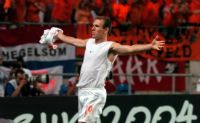
2003-17 Netherlands
You’ve scored so many goals in your career by cutting inside on your left foot before bending the ball into the far corner. How did this become your most dangerous weapon?
Ryan Smith, Glasgow
In my youth-team days, I was always a left-winger who would stay close to the byline and put crosses in the box, so I could never cut inside and shoot. It was only when I joined Real Madrid and started playing in a more central position, and then on the right wing, that I suddenly realised I had a really dangerous weapon. I’d say the most important thing is always retaining an element of surprise, so I can carry on scoring goals like that.
Johan Cruyff once said about you: “He’s got tremendous talent and a beautiful left foot, but his right leg is made of chocolate.” Did you ever get to talk to him about that?
Simon Crown, Middlesbrough
Never – but he’s not the only person who’s said that! I can’t do anything with my right foot but I’ve made it to the top. Modern coaches want young players to work on both feet, but I’m not so sure that's a good thing. Some players have got one very good foot, so you then have a question: Do you make that foot exceptional, or work on both and maybe just have two very good feet? Maybe players should focus on maximising the potential of their strongest foot?
You came close to leaving PSV for Manchester United in 2004. What did Alex Ferguson say to you and why didn’t you end up going there?
Jeremy Finch, Stockport
I had a very good conversation with him over dinner in Manchester and we spoke about football and life. I also went and had a good look around the training ground and everything was good, but after I went back to PSV nothing happened. There was no real contact and the deal didn’t happen. PSV were also negotiating with Chelsea at that time, so maybe they offered PSV more money? I don’t really know. I spoke to Chelsea and I liked their plans. We had one meeting and everything was done pretty quickly. Had Manchester United offered me a deal straight after I met them, I would have signed there, but it didn’t happen and I’ve got no regrets.
You joined Chelsea for £12 million in 2004 when you were just 20. What was it like playing under Jose Mourinho?
Julian Price, Cambridge
He was really demanding and intense, but at that age I think it was good for me and my football development. I'm a student and someone who wants to improve and work hard, so I think our personalities were a good fit. I played a lot of football under Mourinho and he was a good man-manager. He gave me a lot of confidence and I’ve got good memories of playing for him.
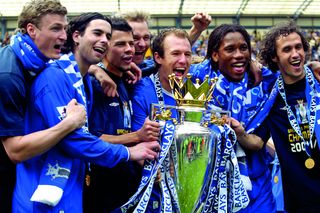
How difficult were your early months at Chelsea after breaking a metatarsal in pre-season?
James White, London
It was really difficult. I had to work my socks off to get fit again, but by the time I made my comeback I was in fantastic physical condition and had a great start at Chelsea. In my first three matches in the starting XI, we won 1-0 and I scored two of the goals. I felt fast and strong, which I realised I needed in England, so maybe my time out did me some good.
Once you were fit your form was just incredible. Did you feel untouchable, and what was the secret to adapting to the English game so fast?
Rory Cordell, London
When I moved to England I wanted to get better. The injury meant that I had the opportunity to focus on the physical side of my game. I had several months of intense work, so by the time I was fit again I was in fantastic condition. This gave me the confidence to show what I wanted to show in the Premier League.
I remember you getting kicked from pillar to post in a game at Blackburn in 2005 after scoring the winner. Was that the most physical game you ever played in? Would that have happened in Spain or Germany?
Tom Thatcher, via Twitter
I remember that match, but there was also another game where I was kicked for the full 90 minutes and got a really bad injury after a terrible tackle. But every game in England is intense and you’ve got to be physically ready and strong. You also have to be smart to protect yourself and prevent injuries.
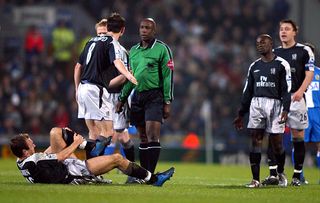
Mourinho became pretty outspoken about your injuries at Chelsea. How frustrating was it to hear your own manager criticising your will?
Charles Scarrott, Stroud
I didn’t see any of the criticism, to be honest. For a manager, it’s difficult if a player is injured because you can’t count on him, so I could understand it a little bit. But it’s worse for a player – you want to be playing and enjoying your football. Jose is a winner and he wants strong players. I felt so much confidence from him when I was fit, but injuries created a bit of a struggle.
You said nobody taught you more in England than John Terry. What did you learn from him?
Chris Spencer, Fulham
He’s one of the greatest captains I’ve ever played with. The way he behaved and conducted himself on a pitch set an example to everyone.
Why did you decide to leave Chelsea for Real Madrid in August 2007? Was it a tough decision to make?
Daniel Walsh, Newcastle
It was hard, although the system had changed a little bit at Chelsea. In my first two seasons we had been playing with wingers, and then Jose switched to a diamond with a physical midfield and two forwards. I could have played as a striker but Andriy Shevchenko and Didier Drogba were first choice at the time. Real came in for me and it was difficult to say no, as it was a forward move for my career – I had to go for it.
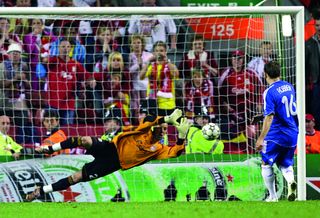
Real supporters have been known to boo even their best players and wave white hankies. Were they a difficult crowd to satisfy?
Harry Rijk, Eindhoven
I always had a good relationship with them. In my first season, we won the league and beat Barcelona 4-1, which was an incredible night. In my second year, I think I played some of the best football of my career. That was when I started playing on the right wing and cutting inside, so I scored lots of goals. If you’re scoring and winning trophies, the fans will always be happy with you.
You said you were forced to move on in 2009, despite playing some of the best football of your career. Did you feel betrayed by the club?
George Parks, Chester
It was a strange time. I played the best pre-season of my career, but Real had spent a lot of money to sign Cristiano Ronaldo, Xabi Alonso, Karim Benzema and Kaka. The board told me, Wesley Sneijder and Klaas-Jan Huntelaar that they had to sell players to make some of the money back. I had no problems with the manager, Manuel Pellegrini, and he told me that he didn’t want me to leave, but the president – Florentino Perez – made the final decision. It was difficult but I decided to leave and sign for Bayern. It ended up being the best move of my career.
‘Robben and Ribery’ or ‘Robbery’ have defined Bayern for nearly a decade. Describe the bond you have both on and off the pitch.
Max Bauer, Munich
I feel that we have got very similar minds, and that has helped create an incredible connection on the pitch. First of all we love the game, but we specifically like one-vs-one situations, as well as setting up goals and scoring them. We are very, very similar, and when we are together it’s not really a surprise that we’ve had so much success.
Was missing the penalty in extra time of the 2012 Champions League Final against Chelsea the worst moment of your professional career? How did all of the Bayern players react to the loss in their own back yard?
Neil Cane, London
It was a huge low point for me and very disappointing for everyone. We were in our own stadium and went 1-0 up with seven minutes left. Unfortunately they equalised and then I missed a penalty. They were the first ones to miss in the shootout, too. When you miss a crucial penalty it’s very, very hard, but you have to recover from that. We recovered very well the following year and proved that we were still a great team at Wembley.
Bayern lost Champions League finals in 2010 and 2012. Did you begin to think you were destined never to win the prestigious prize?
Rodrigo Sanchez, Madrid
Of course. Before the third final against Borussia Dortmund in 2013, there was incredible pressure. While my mindset was very positive and I was convinced we would win it this time, at Wembley, I was also thinking, ‘I can’t play in three Champions League finals and lose all of them’ – nobody wants that label on their career! Everyone would have said, ‘He achieved a lot of things, but didn’t win the Champions League’.
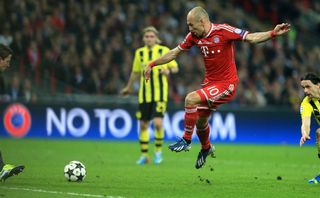
What emotions were going through your head when you scored the late winner in the final? That must have been a big weight off your shoulders...
Taylor Johnson, via Facebook
It was like the script for a film or a book. I missed a penalty against Chelsea the previous year, and then 12 months on I scored the winner. I believe it’s a great example of the sort of character needed to achieve success in sport. If you have a massive setback, you always have to stand up and fight back, and I did that.
You won your first Netherlands cap at a time when Robin van Persie, Rafael van der Vaart and Wesley Sneijder were also coming through. How did the Oranje not win a tournament with all that talent?
Tom Bearden, Nottingham
I think we had success for such a small country. In 2010 we were second and in 2014 we were third – that's not too bad, I would say. Of course you always want to win a trophy, but then we have a population of just 16 million people, so I think to come in second and third is pretty good and not something we have done regularly in previous years.
The Netherlands failed to qualify for Euro 2016 and the 2018 World Cup. What’s gone wrong with Dutch football recently?
Steve Peach, Norwich
We've always had a unique style of football, but the game develops and we have to adapt. You need your own identity but also have to learn things from others. Around 10-15 years ago, it was other countries coming into our kitchen to see how we did it. But now we need to be more open and look at other teams and countries ourselves, to learn about them and their tactics.
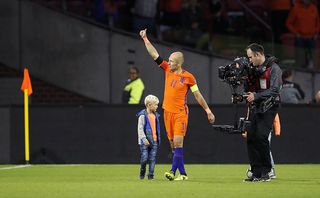
You were labelled ‘the man of glass’ by the Dutch media because of your injury problems, but represented the national team for 14 years. Did that criticism hurt you?
Frank Schif, Amsterdam
It really did. When you’re younger, you’re a lot more sensitive. Perhaps if those people had said it when I was older I wouldn’t have cared so much, but I wanted to prove them all wrong. To me, ‘the man of glass’ sounds like they thought I was weak. It had nothing to do with me being weak – it was just that I had a sensitive body at that time. I thought to myself, ‘I don’t break’ and thankfully I proved them wrong in the end. Maybe I had the last laugh.
Iker Casillas’s boot prevented you from scoring the winner in the 2010 World Cup Final. Does that moment still haunt you?
Thomas Reynolds, Kensington
Just like all of the trophies I have won, that disappointment will stay with me for the rest of my life. I had a big chance to win the World Cup when I was one-on-one with Iker Casillas, and if I had placed the ball three centimetres higher then it would have gone in. After the match, I thought maybe I should have gone round him, but when I saw it again, I felt I’d made the right decision. Casillas decided to go down to his left and then stuck his leg out, as he didn’t think I was going to shoot. If I had the same opportunity again, I would still try to finish it the same way, except three centimetres higher!
You've worked under Louis van Gaal with Bayern Munich and the national team – how did you find him to play for?
Michael Haan, via Facebook
Louis is a great coach. It can be very intense working with him sometimes but he is very, very clear and good at improving individual players. I have learned so much from him over the years, and Louis was a big reason why I joined Bayern when I left Real Madrid. Luckily, I got the chance to play under him again with the national team and we had some success both times that we worked together.
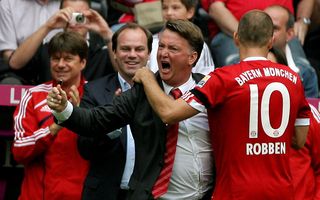
You’re one of just a handful of players to have worked under Jose Mourinho and Pep Guardiola, so how do the two coaches compare?
Eugene Chambers, Lincolnshire
Every manager has got their own style. As a player, you must learn from them and pick up the things you need. With Jose I was younger, but with Pep I was a lot older. They are both tremendous coaches and I learnt a great deal from both of them during my career.
Will you become a manager one day? I assume you’ll use inverted wingers...
Jamie Berger, Luton
I’m not sure right now. I enjoy working with the younger players and helping them to develop. I already help out with my son’s local team from time to time. I am in love with football, but I’m not sure if managing is what I see myself doing in the future.
You turned 34 this year but seem to have improved physically with age. How have you managed to do that?
John Mills, via Twitter
I started working with an osteopath in my final year at Real Madrid [2009]. He explained that everything in my body has to be in alignment, like blocks. I’m a bit like a Formula One car – if there’s one little screw that’s not so good, my motor will blow up. The muscles need to work as efficiently as possible, and thankfully they do now.
Describe your career in one word...
Phil Moore, via email
I’d say ‘great’! I’ve had so many great moments and won lots of titles. There have been many hard moments and setbacks but I’ve bounced back. There have been more good moments than low moments, and hopefully I’ll enjoy a few more good years before I retire.
This feature originally appeared in the May 2018 issue of FourFourTwo. Subscribe!

'I told Fergie before the 1999 Champions League final, "They’ll suffer for the rest of their lives if they lose". He said, "F**k, I can’t tell them that… but he did"': How Sir Alex Ferguson motivated his Manchester United side in an unusual way

‘When Ruud van Nistelrooy missed his late penalty, I showed how I felt. You can say it’s not sporting, but I didn’t hit anyone, unlike Cantona. I have no regrets about it’: Ex-Arsenal defender Martin Keown discusses infamous 2003 moment at Old Trafford
Most Popular


